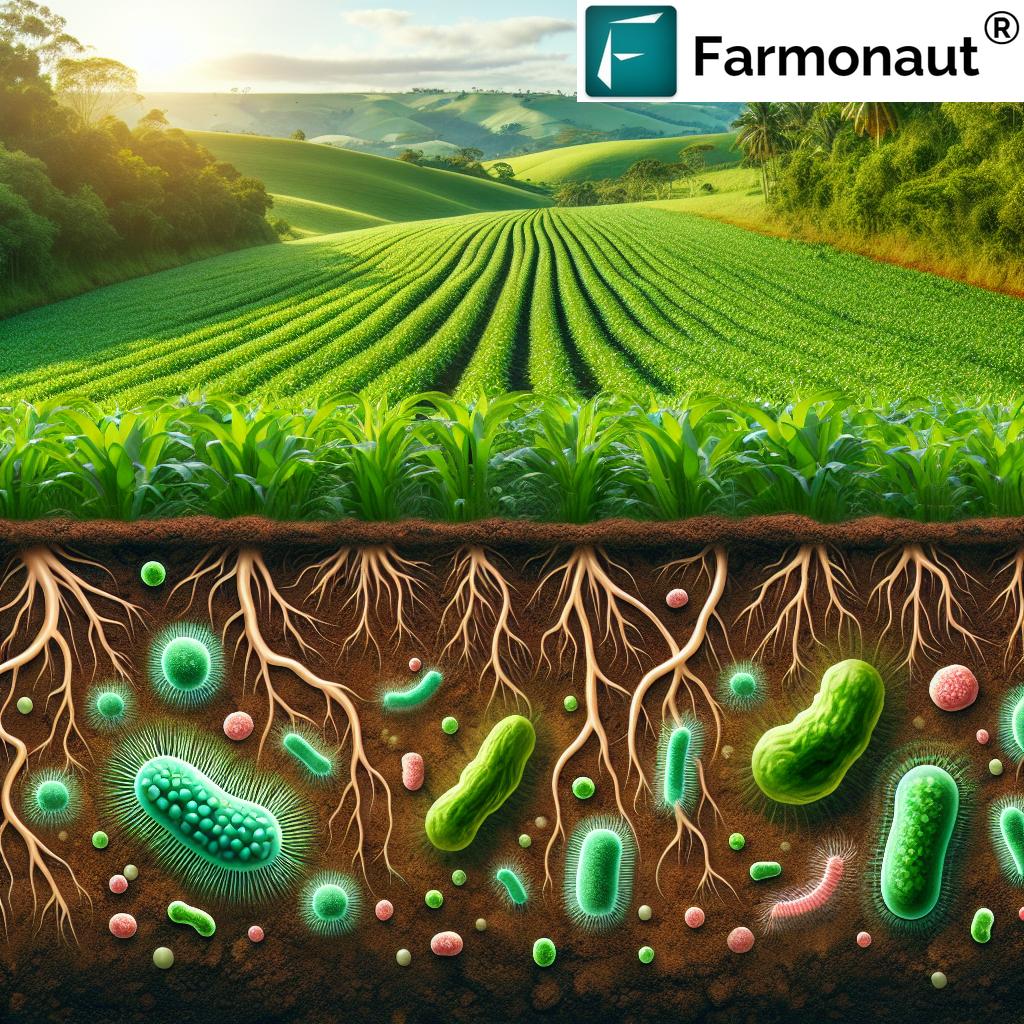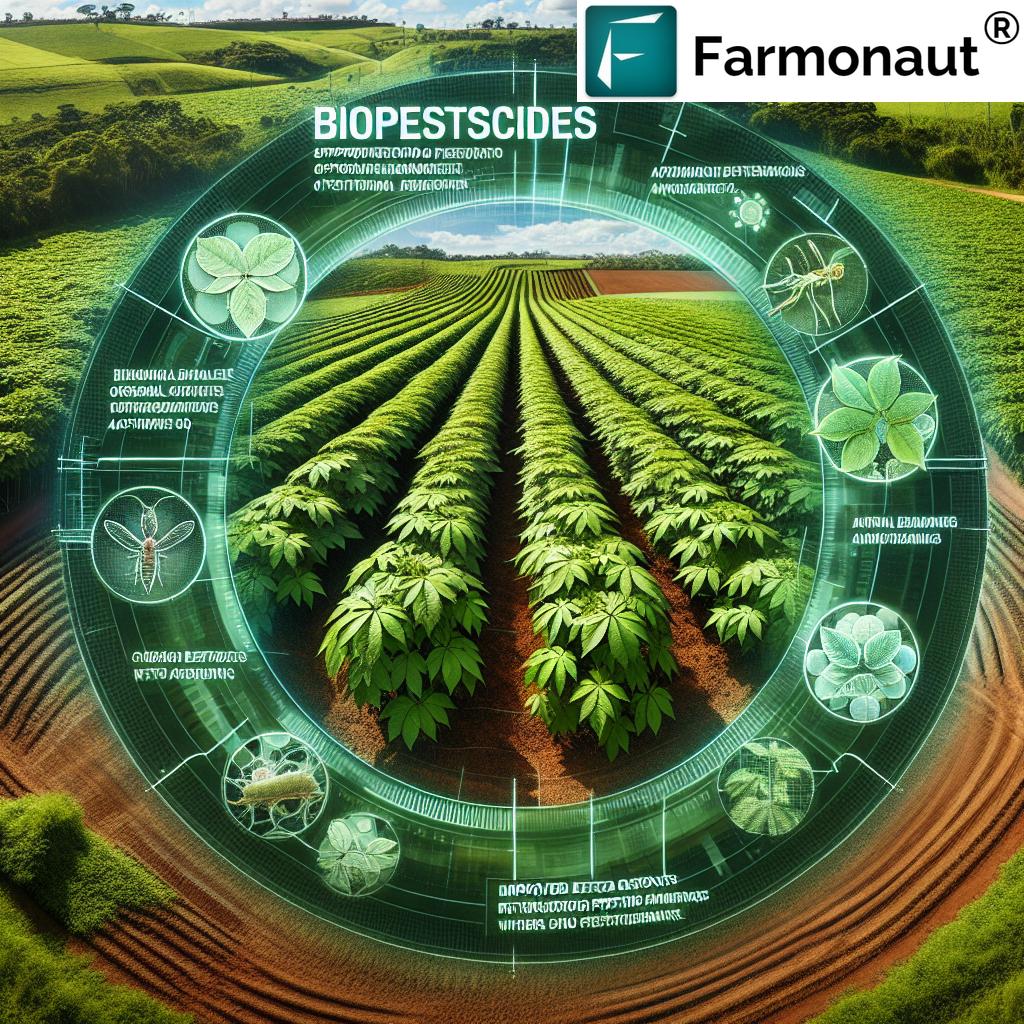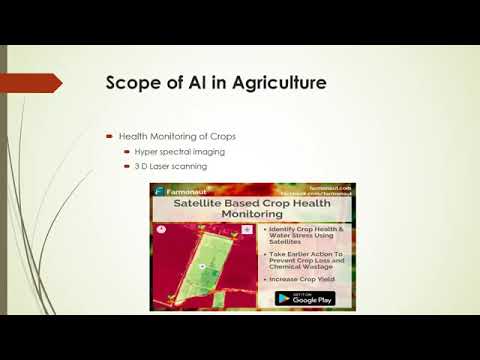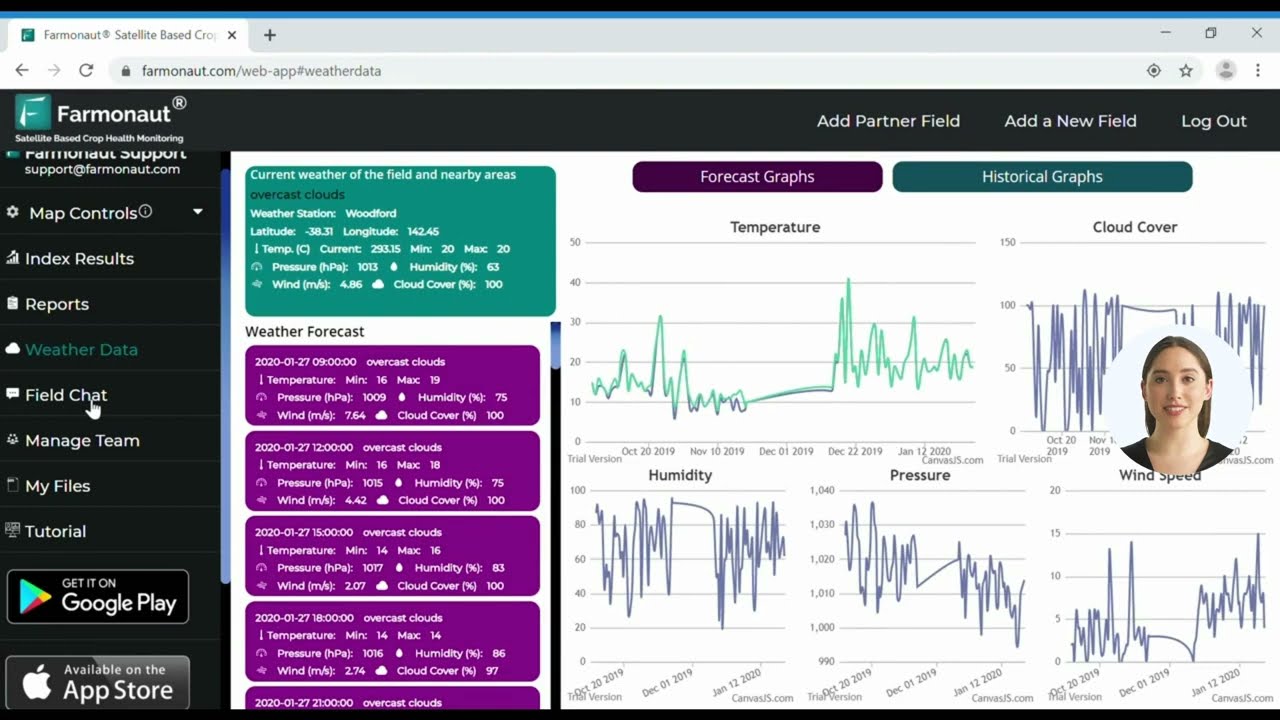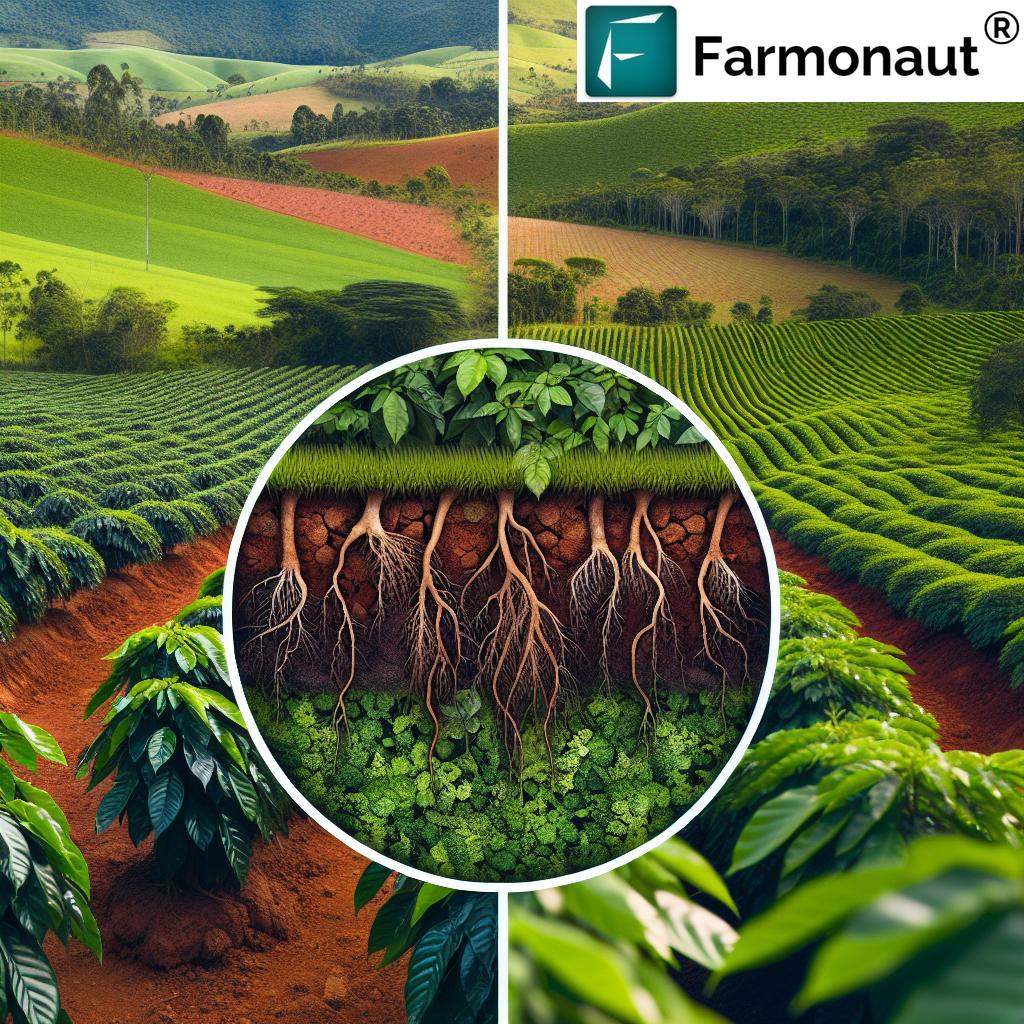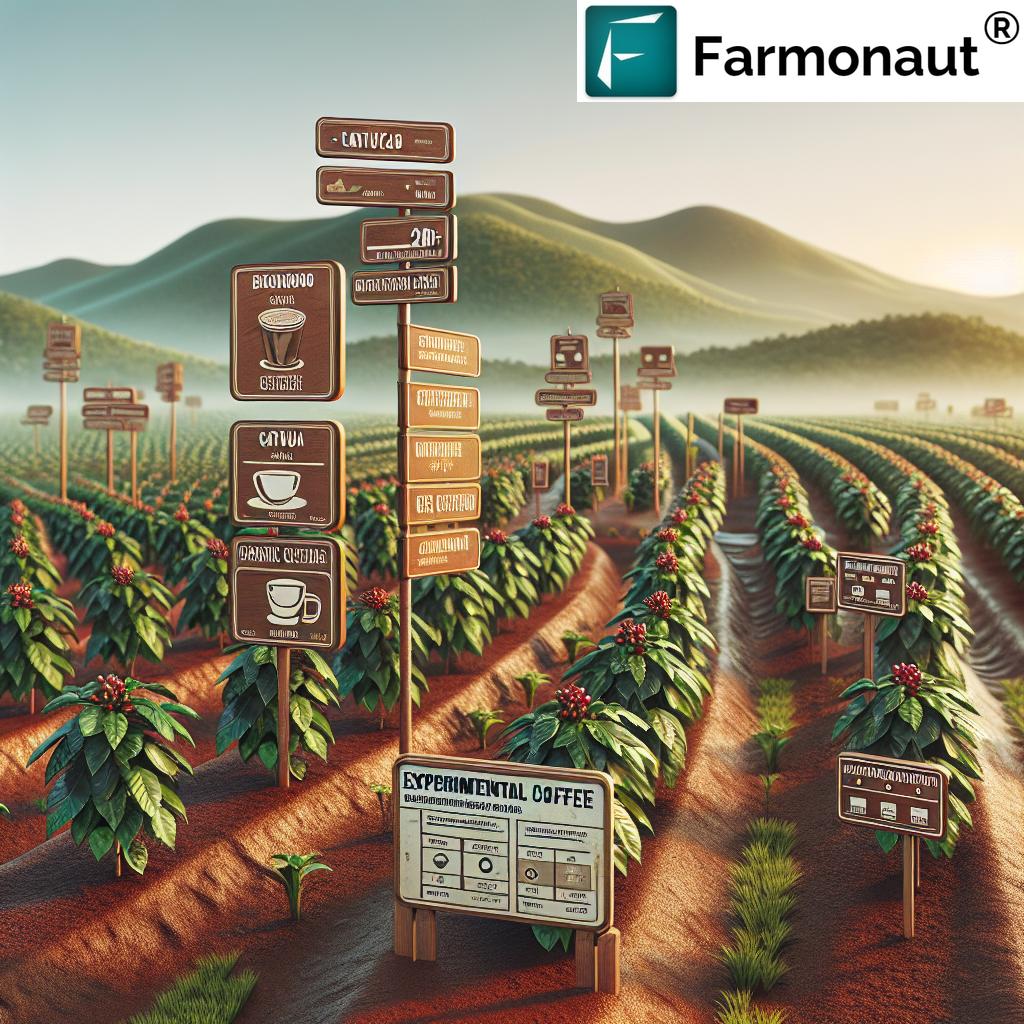Table of Contents
- Summary: Biological Products in Agriculture—Enhancing Sustainability and Productivity
- Trivia: Incredible Impacts of Biological Products
- What Are Biological Products in Agriculture?
- Types of Biological Products in Brazilian Agriculture
- Environmental Benefits & Sustainability of Bioinputs
- 7 Shocking Biological Products for Agriculture in Brazil
- Comparative Table: Benefits of the Top 7 Biological Products
- Key Challenges and Considerations
- Brazil’s Bioinputs Market & Future Outlook
- Empowering Sustainable Agriculture with Farmonaut
- Frequently Asked Questions
7 Shocking Biological Products for Agriculture in Brazil
Biological Products in Agriculture: Enhancing Sustainability and Productivity
As practitioners, innovators, and advocates for sustainable agricultural practices, we all seek solutions that balance crop productivity, soil health, and environmental well-being. The rapid evolution of biological products in agriculture is revolutionizing how we approach pest control, nutrient management, and overall sustainability in Brazilian farming.
These bioproducts act as natural alternatives to chemical pesticides and fertilizers, helping us improve soil health, promote robust plant growth, and protect crops from pests and diseases—all while reducing our environmental footprint. In the heart of Brazil’s agricultural sector, which is at the forefront of the global bioinputs movement, integrating these biological solutions offers hope for a greener, more resilient, and thriving future.
What Are Biological Products in Agriculture?
Biological products—whether called bioinputs, bioproducts, or agricultural biologicals—are derived from living organisms (such as bacteria, fungi, viruses, algae, or other microbes) or the active compounds they produce. The aim? To enhance nutrient cycling, improve soil structure, promote crop growth, protect plants from pests and diseases, and build resilience against environmental stressors. For decades, the agricultural sector in Brazil has relied heavily on synthetic agrochemicals, but biological solutions now offer safer and more effective alternatives aligned with sustainable farming practices.
- Biofertilizers: Enrich soil by restoring the natural nutrient cycle and promoting plant nutrient uptake
- Biopesticides: Protect crops from pests, employing natural predators, bacteria, viruses, and plant extracts like neem oil
- Biostimulants: Boost plant growth, tolerance to abiotic stress, and crop quality
- Bioherbicides: Target unwanted weeds using phytotoxins, microbial metabolites, or plant extracts
- Biological Nematicides: Control nematode infestations with microbes or plant-derived solutions
When considering biological products in agriculture, it’s vital to appreciate their role as natural alternatives to chemical pesticides and synthetic fertilizers, promoting not only crop productivity but also environmental sustainability and soil health.
Types of Biological Products in Brazilian Agriculture
Let’s explore the main categories of biological solutions commonly used in Brazilian farming, blending traditional knowledge with modern science to tackle agricultural challenges:
1. Biofertilizers for Crop Growth
Biofertilizers are unique in that they contain living microorganisms capable of colonizing the plant’s rhizosphere or interior. Their function is to improve the availability of primary nutrients—such as nitrogen, phosphorus, and potassium—by restoring and maintaining a healthy soil organic matter cycle. Noteworthy examples include Rhizobium (legume symbiosis), Azotobacter, Azospirillum, and blue-green algae.
- Promote crop growth via nitrogen fixation and nutrient cycling
- Improve soil health and structure, while increasing the efficiency of water use
- Restore the natural organic matter balance, reducing the need for synthetic fertilizers
2. Biopesticides for Pest Control
Biopesticides are derived from natural bacteria, fungi, viruses, algae, or plant extracts such as neem oil. Their principal objective is the control of pests and diseases, offering an effective and eco-friendly solution as compared to traditional chemicals.
- Bacillus thuringiensis (Bt) is a bacterium that produces proteins deadly to targeted insect pests
- Neem oil has broad-spectrum insecticidal properties
- Helps reduce chemical pesticide usage and minimizes pest resistance
- Promotes environmental sustainability and farm safety
3. Biostimulants for Plant Growth
Biostimulants are substances or microbial products that stimulate plant processes naturally, building crop vigor and tolerance to abiotic stress (like drought, salinity, or extreme temperatures). They enhance nutrient uptake, root development, and crop quality.
- Include humic and fulvic acids, seaweed extracts, beneficial microbes, and fungi like Trichoderma
- Strengthen resistance to environmental stress and improve crop yields
- Help maintain soil structure and boost beneficial microorganisms
4. Bioherbicides: A Natural Weed Solution
Bioherbicides offer targeted action against unwanted weeds utilizing phytotoxins, fungi, or microbial secondary metabolites. Their environmental impact is far lower than conventional herbicides.
- Control invasive weed development without harming crops or soil life
- Use natural compounds, reducing risk of chemical buildup
- Help restore biodiversity & reduce herbicide resistance
5. Biological Nematicides: Combat Nematodes Sustainably
Biological nematicides emphasize managing nematode infestations naturally. Derived from bacteria, fungi, or plant metabolites, they outcompete, paralyze, or destroy nematodes, contributing to long-term soil health.
- Lower crop damage from nematodes without chemical residues
- Maintain soil microbial balance
- Promote robust root and plant development
Environmental Benefits of Bioinputs & Why They Matter
By using biological products in agriculture, we support a healthy and balanced agro-ecosystem that is both productive and sustainable. Here’s how bioinputs help us safeguard the environment:
-
Soil Health Restoration:
- Re-introduce beneficial microorganisms—key for building organic matter and deepening soil structure
- Stimulate natural nutrient cycles and maintain fertility long-term
-
Reduced Environmental Pollution:
- Lower chemical run-off, preserving water bodies and biodiversity
- Mitigate soil, water, and air contamination through less reliance on synthetic agrochemicals
-
Lower Resistance Risk:
- Pests, pathogens, and weeds develop resistance more slowly due to complex and diverse natural modes of action
-
Climate Change Mitigation:
- Some biofertilizers and biostimulants increase carbon sequestration in soil
- Support resource efficiency and lower agricultural carbon footprints
- Learn more about monitoring and lowering your farm’s environmental impact with Farmonaut’s Carbon Footprinting Solution
-
Enhanced Crop Quality & Food Safety:
- Reduced chemical residues in food products
- Meet stringent international export requirements
7 Shocking Biological Products for Agriculture in Brazil
Brazil is a global leader in the adoption of biological products in agriculture. Here we unveil seven of the most influential bioinputs and solutions that are driving a paradigm shift towards greater crop productivity, soil health, and agricultural sustainability.
-
Bacillus thuringiensis (Bt) – Targeted Pest Control
We recognize Bacillus thuringiensis (Bt) as one of the most celebrated bacterial biopesticides for pest control. Naturally found in soil, Bt releases proteins toxic specifically to lepidopteran insects (such as caterpillars), but not to birds, mammals, or beneficial insects. In Brazil, Bt-based bioproducts are widely used on soybean, maize, and cotton plantations, drastically reducing chemical pesticide use.
- Main Benefits: Selective pest control, low risk to non-target organisms, minimal chemical residue
- How It Works: Bt spores or proteins are sprayed on crops or incorporated into seeds. Targeted pests ingest the proteins, which disrupt the gut lining and cause death. This focused mechanism prevents rapid pest resistance development.
- Environmental Impact: Reduces chemical input, protecting beneficial insects and biodiversity
-
Neem Oil – The Versatile Insecticide
Neem oil, derived from the Azadirachta indica tree, is a multi-purpose natural insecticide used to target a broad array of insect pests in Brazilian farming. What sets neem apart is its content of azadirachtin—a compound that disrupts insect hormone systems, deterring feeding and growth across hundreds of pests.
- Main Benefits: Safe for humans, birds, and bees; biodegradable; low risk of resistance
- How It Works: Used as sprays, seed treatments, or soil drenches; neem oil acts as a repellent, feeding deterrent, insect growth regulator, and even a mild fungicide
- Environmental Impact: Naturally decomposes without polluting soil or water; much lower toxicity than chemical insecticides
-
Rhizobium Biofertilizer – Legume Growth Accelerator
Rhizobium is a genus of soil bacteria crucial for the nitrogen fixation process in legumes (soybeans are a primary crop in Brazil). Biofertilizers based on Rhizobium establish beneficial symbiosis with plant roots, forming nodules to convert atmospheric nitrogen into a plant-available form.
- Main Benefits: Enriches soil nitrogen, fosters root development, replaces synthetic nitrogen fertilizers
- How It Works: Seed inoculation or root zone application allows the biofertilizer to colonize the rhizosphere, boosting plant growth and reducing fertilizer input cost
- Environmental Impact: Lower greenhouse gas emissions, improved soil fertility, increased yields
-
Trichoderma Fungi – Nature’s Disease Shield
The Trichoderma genus of fungi is renowned for controlling a wide range of plant diseases—from soil-borne pathogens like Fusarium and Pythium to foliar diseases. By outcompeting pathogens, producing antifungal compounds, and triggering plant defense mechanisms, Trichoderma acts as both a biostimulant for plant growth and a biopesticide.
- Main Benefits: Increases seedling vigor, controls disease, triggers resistance responses
- How It Works: Applied as seed coating, soil amendment, or foliar spray; helps colonize the plant root zone and improves soil health while suppressing disease outbreaks
- Environmental Impact: Reduces fungicide use, enhances biodiversity in the rhizosphere
-
Azospirillum – Root & Growth Enhancer
Azospirillum is a beneficial bacterium known for its plant growth-promoting properties, especially in cereal and grass crops widely grown in Brazil. Apart from fixing nitrogen, Azospirillum produces phytohormones that stimulate root elongation and shoot development.
- Main Benefits: Promotes root health, increases tolerance to abiotic stress, accelerates plant growth
- How It Works: Applied as seed inoculant or soil drench, helping plants develop robust root systems and increase nutrient uptake
- Environmental Impact: Enhances fertilizer efficiency, reduces runoff, builds resilient crops under drought or salinity
-
Blue-Green Algae Biofertilizer – Photosynthetic Powerhouses
Cyanobacteria, or blue-green algae, act as powerful biofertilizers in rice paddy systems and waterlogged soils, common across Brazil’s wetlands. They provide a natural, solar-driven engine for nitrogen fixation and soil organic matter restoration.
- Main Benefits: Boosts nutrient cycling, fixes atmospheric nitrogen, improves soil fertility and structure
- How It Works: Direct application to flooded fields or integrated with irrigation water adds living or dried cyanobacteria to speed up natural nitrogen enrichment
- Environmental Impact: Reduces nitrogen fertilizer bills and greenhouse gas emissions from paddy fields
-
Paecilomyces lilacinus – Bio-Nematicide for Root Health
Paecilomyces lilacinus is a soil fungus used primarily for its biological nematicide capabilities. It parasitizes nematode eggs and juveniles, suppressing outbreaks without chemical nematicides. In Brazil’s intensive horticulture and soybean production, this bio-solution is vital for crop health and yield.
- Main Benefits: Controls root-knot nematodes, supports strong root growth, and limits crop loss due to nematode damage
- How It Works: Used as a soil amendment or seed treatment; spores directly attack nematode eggs
- Environmental Impact: Reduces nematicide residues and enhances overall soil biological activity
Comparative Benefits Table of Biological Products For Agriculture in Brazil
| Product Name | Main Biological Agent / Ingredient | Primary Function | Estimated Impact | Application Method | Sustainability Benefit |
|---|---|---|---|---|---|
| Bacillus thuringiensis (Bt) | Bacterial spores and proteins | Pest control (insects, caterpillars) | Up to 85% reduction in chemical insecticide use* | Foliar spray, seed treatment | Protects beneficial species; reduces pesticide pollution |
| Neem Oil | Neem tree extract (azadirachtin) | Multi-pest insecticide | 10–20% increase in yield; >50% drop in chemical residues* | Spray, seed/soil treatment | Biodegradable; toxin-free for non-targets |
| Rhizobium Biofertilizer | Nitrogen-fixing bacteria | Soil enrichment & nutrient supply | 15–30% yield improvement; up to 100% chemical N replacement* | Seed or root inoculation | Reduces need for synthetic fertilizers |
| Trichoderma Fungi | Beneficial fungi | Disease control (fungal pathogens) | Reduce crop loss by up to 35%* | Seed, soil, or foliar application | Increases rhizosphere biodiversity |
| Azospirillum | Nitrogen-fixing bacteria | Plant growth stimulation | 20% yield boost; more robust roots* | Seed, soil, or foliar inoculation | Supports drought tolerance, fertilizer efficiency |
| Blue-Green Algae | Cyanobacteria | Soil organic matter and N fixation | Increase soil fertility by 10–25%* | Field irrigation or direct soil application | Supports organic cycling, climate adaptation |
| Paecilomyces lilacinus | Beneficial fungus | Nematode control | Up to 90% reduction in nematode population* | Soil amendment, seed treatment | Reduces chemical nematicide usage |
*Approximate values based on published research and on-farm surveys in Brazil.
Main Challenges and Considerations for Biological Solutions in Agriculture
While the environmental benefits of bioinputs are clear, some important challenges must be managed for widespread adoption and consistent performance:
- Consistency & Efficacy: Biologicals often depend on specific environmental factors—temperature, soil pH, rainfall, and microbial community balance can all affect how well a bioproduct works.
- Regulatory Landscape: With regulations evolving rapidly, the approval process for new products may be lengthy or variable. This can slow commercial introduction despite promising results in trials.
- Farmer Education: Transitioning from chemical to biological management systems requires robust training for farmers. Proper use, timing, and product selection are keys to success.
- Quality Control: Biological inputs must contain viable, active agents. Shelf life and storage conditions matter more than for synthetic agrochemicals.
Solutions like satellite-based field verification for insurance and loans (offered by Farmonaut) help reduce risk for both farmers and financial institutions, ensuring that those investing in bioinputs have access to secure support systems.
Brazil’s Bioinputs Market and Future Outlook: The Fastest Growth Globally
According to recent research, Brazil’s bioinputs market has grown at an average annual rate of 21%—over four times the global average. This remarkable pace is propelled by farmer demand for sustainable solutions, stringent export standards, and the availability of diverse biological products tailored for major crops.
-
Technological Advancement:
- Use of satellite imagery, AI-based recommendations, and advanced farm analytics helps optimize the application and efficacy of biological products.
- Get advanced satellite and weather data for farm management via Farmonaut’s API and explore the developer documentation to seamlessly integrate precision data into your farm or agribusiness.
-
Investment in Sustainability:
- Farmers are rewarded for reducing the environmental impact of agricultural output.
- Tools for traceability—such as Farmonaut’s blockchain-based product traceability—assure ethical sourcing and consumer trust.
-
Strategic Crop Management:
- Using AI-driven advisory systems, such as Farmonaut’s Jeevn AI platform, farmers gain access to real-time crop health, weather, and soil nutrient insights, leading to more targeted use and better results from bioinputs.
- Large plantations and forest managers can take advantage of Farmonaut’s large-scale farm management solutions for efficient team coordination and satellite-based crop monitoring.
Empowering Sustainable Agriculture with Farmonaut
At Farmonaut, we help farmers, agribusinesses, and institutions unlock the full value of biological products in agriculture with precision digital monitoring and smart data.
- Satellite-Based Crop Health Monitoring: Our platform delivers real-time data on vegetation health, soil moisture, and crop stress, so you can make informed decisions on nutrient management, irrigation, and pest interventions.
- AI-Driven Farm Advisory: The Jeevn AI system offers personalized, actionable insights to optimize the timing and dosing of biofertilizers, biostimulants, and biopesticides—boosting efficacy in the field.
- Blockchain Traceability: With traceability solutions, easily record and verify every bioinput application, improving transparency for buyers and regulators who demand sustainable practices.
- Resource Optimization & Carbon Footprinting: Track your carbon footprint, optimize fleets, and confidently reduce your farm’s environmental impact.
- Scalable & Affordable Solutions: Whether you manage a small family farm or an expansive plantation, our affordable, subscription-based services help you improve productivity and sustainability at scale.
Are you ready to move beyond guesswork and maximize the benefits of biological products in your fields? Get started with Farmonaut’s satellite-based platform today!
Frequently Asked Questions (FAQ): Biological Products for Agriculture in Brazil
1. What are biological products in agriculture?
Biological products in agriculture, or bioinputs, are substances derived from living organisms or their by-products, used to promote plant growth, protect against pests and diseases, and improve soil health. They are eco-friendly alternatives that support sustainable farming practices.
2. How do biological products improve soil health?
Biological products like biofertilizers, biostimulants, and beneficial microbes introduce or support organisms that enhance nutrient availability, recycle organic matter, and increase soil organic carbon. These actions strengthen the soil’s structure, water retention, and overall fertility.
3. Are biopesticides safe for humans and the environment?
Yes! Biopesticides, such as Bacillus thuringiensis (Bt) and neem oil, target specific pests and break down quickly in the environment, reducing risks of pollution and harm to humans, pollinators, and other non-target species.
4. What are the benefits of using biological products over conventional chemicals?
- Reduced environmental pollution and chemical residues
- Lower risk of resistance development in pests and diseases
- Improved crop quality and compliance with food safety/export standards
- Enhanced biodiversity in and around farming systems
- Increased resilience to climate and abiotic stresses
5. Where can I access digital solutions to monitor and manage biological products on my farm?
Digital precision agriculture platforms like Farmonaut provide affordable, satellite-based crop health monitoring, resource management, and AI-driven advisory systems. These tools help you optimize input use, boost yields, and document sustainable agricultural practices across your operation.
Ready for More Sustainable, Profitable Farming?
Discover how Farmonaut empowers your growth, trace your products seamlessly, and lead in eco-friendly agriculture.
Try Farmonaut Today!


